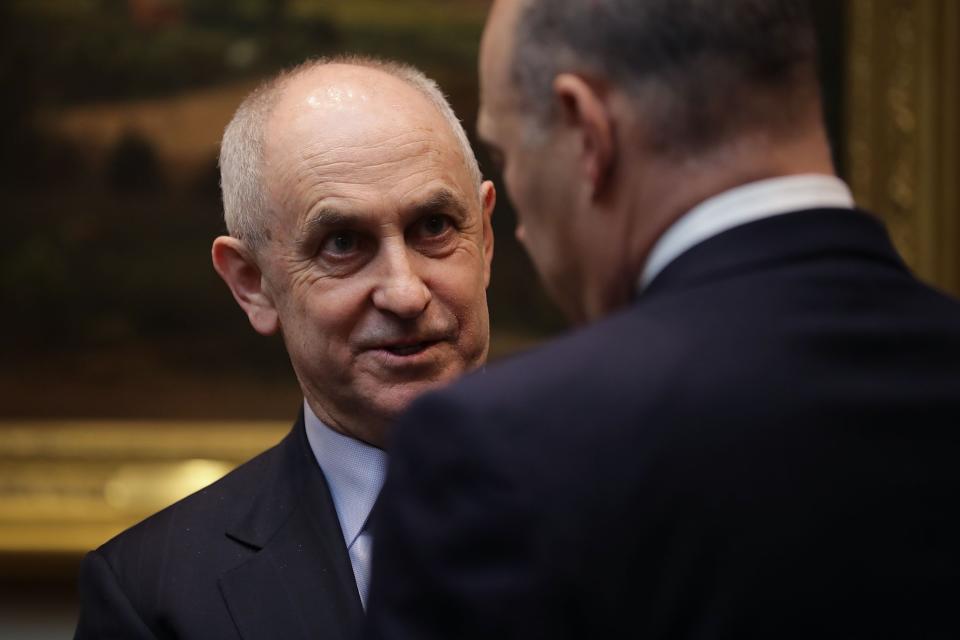Meet Trump's liaison to Apple's Tim Cook and Amazon's Jeff Bezos
CEOs are a staple at the Trump White House, with the nation’s top business leaders routinely stopping by for photo ops, strategy sessions and make-nice meetings with the president. So it might seem routine that a gaggle of top tech CEOs are paying Trump a visit this week.
But the White House has a meaty agenda regarding technology—and a driven former executive in charge of accomplishing it. Christopher P. Liddell is Trump’s Director of Strategic Initiatives, a sleepy-sounding title that belies Liddell’s deep connections in several key industries and, perhaps, an ability to get things done in Washington even as much of Trump’s agenda stalls. “He’s a talented guy, very numbers-oriented. Likes to deal in facts,” says one executive who has worked with Liddell. “He’s a pretty hard-charging guy.”
Liddell, 59, is a New Zealand native who was naturalized as an American citizen. Before joining the Trump administration, he was chief financial officer for the Los Angeles talent agency WME-IMG. That followed a 14-month stint as CFO of General Motors (GM), with Liddell shepherding the auto giant’s 2010 public offering, as it emerged from bankruptcy. Before that, Liddell spent four-and-a-half years as CFO of tech giant Microsoft (MSFT). He competes in triathlons and has a master’s degree in philosophy from Oxford, along with an engineering degree from Auckland University. So he’s got the chops to talk business with CEOs like Tim Cook of Apple (AAPL), Satya Nadella of Microsoft, Jeff Bezos of Amazon (AMZN) and other heavy-hitters swinging by the White House this week.

Liddell was considered a candidate to be CEO at Microsoft and GM, but moved on after the top job went to somebody else. He got seriously involved in politics after leaving GM by signing on as an adviser to 2012 presidential candidate Mitt Romney, becoming one of the top people in charge of the transition to power, had Romney won. He even co-authored a book on the Romney transition plan, earning praise for a nonpartisan account that was as much business-school case study as political memoir. “He was someone who could give fresh perspective,” says a fellow alum of the Romney campaign. “He’s an adult who understands business and different constituencies such as the donor world and regular voters. He has a knack for how people might respond to things.”
That would make him a Trumpian pragmatist, aligned with Gary Cohn and Jared Kushner, rather than a Trumpian disruptor in the Steve Bannon mode. Liddell also has more of a bipartisan brief than others in the White House, which could help him navigate legislative channels otherwise jammed by partisan warfare.
Where Liddell differs from Trump
Liddell has a broad portfolio, but at the recent Milken Institute annual conference, he highlighted two key issues his group is working on. The first is finding ways to alleviate the destruction of jobs caused by new technology. “The role of technology in job destruction is certainly one of the biggest issues we face,” he said. “Every country in the world is facing it.”
Trump talks frequently of “bringing back” American jobs lost over the years as some companies have moved work to lower-cost countries, and machines do more and more of the jobs humans once did. But Liddell’s view seems to differ from his boss’s. He believes new technology will bring more companies and more work to America, as labor becomes a smaller portion of overall cost for producers. “As robotics has become much more prevalent,” he said in May, “the embedded labor cost in most high-tech manufactured products has become increasingly less. As you get to those sorts of scales, the differential that we previously had in moving manufacturing to cheap labor places starts to dissipate. Labor costs are overtaken by transport costs, supply-chain costs, foreign-exchange risk, and, potentially, policy changes.” The upshot for companies is that America starts to look more attractive as a place to do business, even without government action.
Liddell’s other major responsibility is modernizing government systems so they’re more like the platforms Americans are used to seeing from Amazon, Apple and the like. This is one big focus of the CEO visits this week—with some of those companies no doubt hoping for lucrative government contracts.
“The average citizen spends a huge amount of time with incredible frustration dealing with the government,” Liddell said at the Milken conference. “Their experience dealing with the private sector in terms of technology is here [hand held high] and their experience dealing with the government is down here [hand held low]. It’s mainly because our systems are something like 20 years out of date.”
Liddell gave one example of government systems failing, without even bringing up the easiest target of all—the disastrous rollout of the Affordable Care Act online exchanges in 2013. “Every Memorial Day, a huge number of people go and look for where their relatives are buried in the cemetery,” he explained. “What happens? There’s a huge spike in activity, and the system crashes. People are incredibly frustrated by what seems to most people like a simple but important thing. There are literally hundreds if not thousands of examples like that that the average citizen deals with every day.”
Many fired-up overachievers have tried to reform the federal bureaucracy before, and left with little to show for their efforts except their own incredible frustration. But they didn’t have allies like Apple, Amazon and Microsoft. Maybe this time will be different.
Confidential tip line: rickjnewman@yahoo.com. Encrypted communication available.
Read more:
Rick Newman is the author of four books, including Rebounders: How Winners Pivot from Setback to Success. Follow him on Twitter: @rickjnewman


